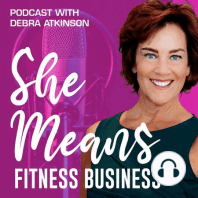18 min listen

5 Biggest Mistakes in Training Women in Menopause
5 Biggest Mistakes in Training Women in Menopause
ratings:
Length:
24 minutes
Released:
Jul 24, 2022
Format:
Podcast episode
Description
Training women in menopause is an honor. They don’t trust easily. They have been around the block. It’s not their first rodeo. And it comes with an opportunity and responsibility. The opportunity is that this woman influences 3 generations. The responsibility is, screw this up and you can change her future for the worse. Muscle, bone, brain health, and diseases made worse with blood sugar issues hang in the wings. No pressure! Lighten up! You’re up to the challenge. This episode is sponsored by the Flipping 50 Menopause Fitness Specialist 1) Solely focused on “functional” exercise Corrective and functional exercise is very important. For this population, it is very much needed! The word “functional” is very misleading, however. In midlife, women juggle – or have a trainer who will for them – multiple needs of metabolism, muscle maintenance, bone density, fat optimization, as well as their mobility and joint/ligament health. A trainer focused only on one or the other, whether it’s lifting heavy and power training, or it’s exclusively corrective exercise at the cost of the others… does a woman a disservice. As always is true in a workout program, there are priorities and then there are secondary goals. A woman might have as her first priority to improve her mobility and any necessary corrective exercises for alignment. Secondary goals may be to begin boosting metabolism and blood sugar support. So, while she’s spending much time doing unilateral work, or isolating some small muscles, she also can begin her strengthening of major muscles and lifestyle movement to reduce blood sugar swings. Helping a client understand this is key to compliance and successful outcomes. 2) Lack of emphasis on timing of exercise The training women in menopause, the timing and type of exercise becomes a real priority. Whether for helping support blood sugar stabilization, or optimizing fat burning or sleep, the influence of hormones on exercise becomes a key to successfully exercising for longevity and results women want today. Late day intense exercise will backfire on more midlife women than it helps. It’s no longer a matter of “whatever time of day you’ll do it” is the best time to exercise. Sleep disruption or quality of sleep issues are more likely to occur and circadian rhythm will be hurt more than helped. 3) Failure to identify signs of hormone issues Knowing that a woman is struggling with hot flashes and night sweats and that this is identified with menopause is one thing. Identifying her burning mouth or electric shocks as the same is another. Knowing how to modify exercise and what to ask about her lifestyle habits for her if she’s got insomnia is still another. There are 34 identified symptoms of menopause, not all are easily identified and in odd combinations are even illusive to doctors. So ,it’s beyond time that trainers who spend so much more time with a client knows what to ask, how to respond, and what to do with the information when it comes to exercise. 4) Recommending clients have hormones tested This is a recommendation assuming a lot. First, it’s assuming a woman wants to take hormone replacement therapy. Second, it’s assuming a woman knows where to get tested and what differences in tests she wants are. Third, it assumes that a woman knows who to go to that will interpret these labs for her optimally not according to norms. Norms are developed according to a whole lot of people who don’t feel good. Norms are nothing more than “average.” If a woman doesn’t feel good, a trainer has already helped identify signs and symptoms and modified exercise and coached lifestyle habits, the first question is, “Do you want to consider hormone therapy or learn more about your options?” From there an educated coach can – within scope of practice – share information, suggest resources, and connect with her network of functional health doctors for the appropriate next step. 5) Inadequate knowledge about la
Released:
Jul 24, 2022
Format:
Podcast episode
Titles in the series (100)
Upside Down Marketing Results in Upside Down Sales: Upside Down Marketing by She Means Fitness Business